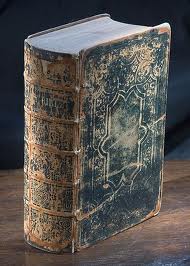 The Jewish Bible, or Tanakh, has three sections: Torah, Prophets, and Writings.
The Jewish Bible, or Tanakh, has three sections: Torah, Prophets, and Writings.
Tanakh is the Jewish name for the Hebrew Scriptures, what Christians call the Old Testament. The word itself is an acronym standing for three words: Torah (the Pentateuch), Nevi’im (Prophets, pronounced n’-vee-eem), and Ketuvim (Writings, pronounced k’-tu-veem). The last two sections, Nevi’im and Ketuvim, can be called Nakh, but this term is primarily used in religious Jewish circles.
Although the contents of the Tanakh are identical to the contents of the Old Testament, the books are organized differently, following slightly different conceptual lines. The order of the books that is familiar to most Christian readers follows the Septuagint tradition and is divided as follows: Law (the five books of Moses); History (Joshua-Esther); Poetry and Wisdom (Job-Song of Solomon) and Prophets (Isaiah-Malachi, including Daniel and Lamentations).
The order of the biblical books in the Tanakh is broken down into three main categories:
 Torah: The five books of Moses; this is identical to the “Old Testament” order, but the books are named after the opening word of each book, and so Genesis is Bereshit, pronounced b’-rey-sheet; Exodus is Shemot, pronounced shey-moht, taken from the second word of the text, names; Leviticus is Vayikra, pronounced, va-yik-rah; Numbers is Bamidbar, pronounced bah-mid-bar; and Deuteronomy is Debarim, pronounced d’-vah-reem, taken from the second word of the text, words. For more discussion of the term Torah, see #5.
Torah: The five books of Moses; this is identical to the “Old Testament” order, but the books are named after the opening word of each book, and so Genesis is Bereshit, pronounced b’-rey-sheet; Exodus is Shemot, pronounced shey-moht, taken from the second word of the text, names; Leviticus is Vayikra, pronounced, va-yik-rah; Numbers is Bamidbar, pronounced bah-mid-bar; and Deuteronomy is Debarim, pronounced d’-vah-reem, taken from the second word of the text, words. For more discussion of the term Torah, see #5.
Prophets: This section is divided into the “Former Prophets”—referring to Joshua, Judges, 1-2 Samuel and 1-2 Kings, based on the belief that these books were all written by prophets—and the “Latter Prophets”—referring to Isaiah, Jeremiah, Ezekiel and Hosea-Malachi, called “The Twelve.”
Writings: This includes all the remaining books, generally in the following order: Psalms, Job, Proverbs, Ruth, Song of Solomon (normally called “Song of Songs,” and based on the opening verse), Ecclesiastes (normally called Koheleth, meaning “the preacher” or “convener,” based on the opening verse), Lamentations (called Eichah, meaning “how, alas” which is the opening word of the book), Esther, Daniel, Ezra, Nehemiah and 1-2 Chronicles.






























